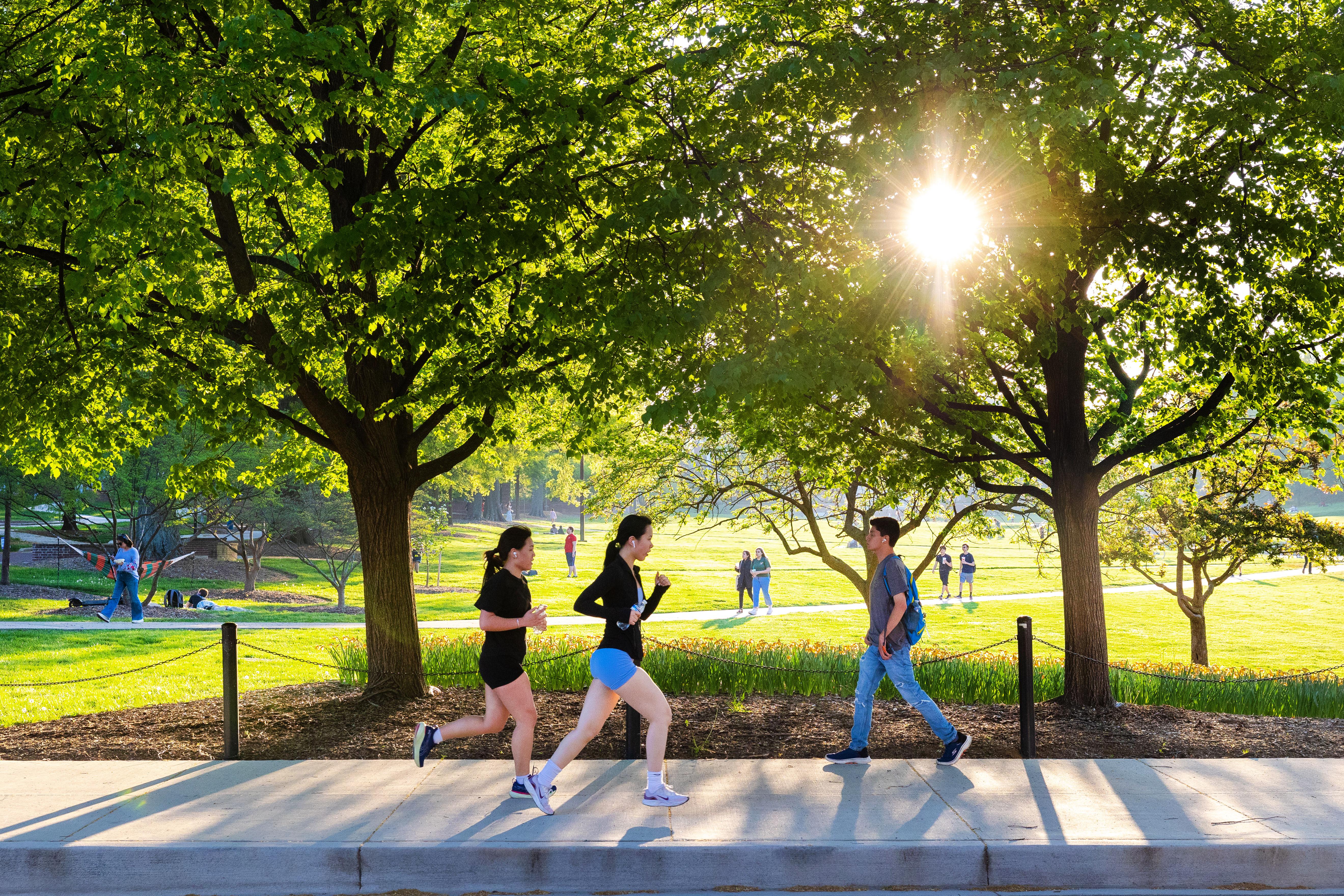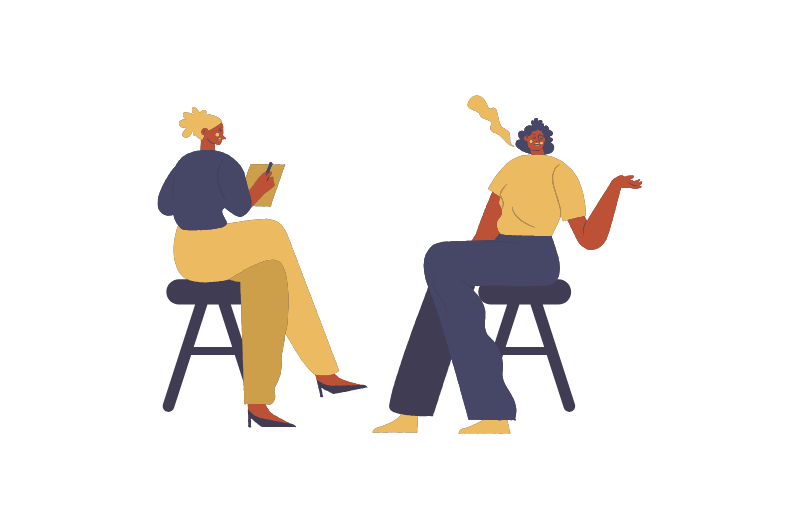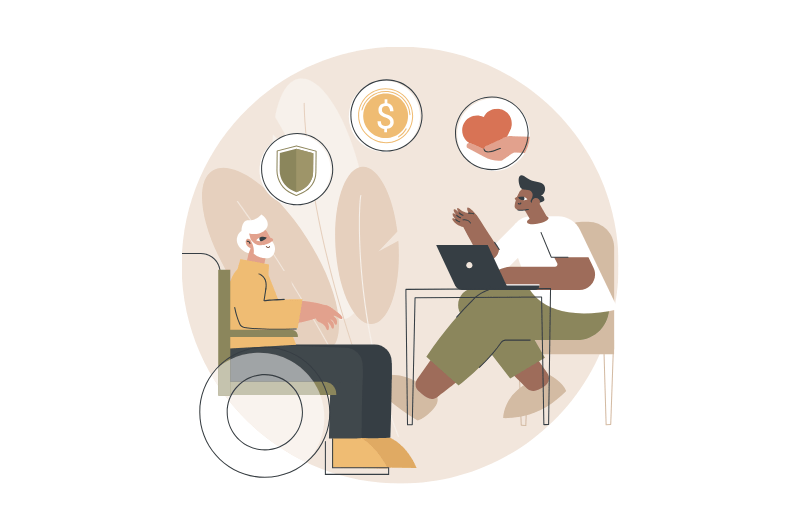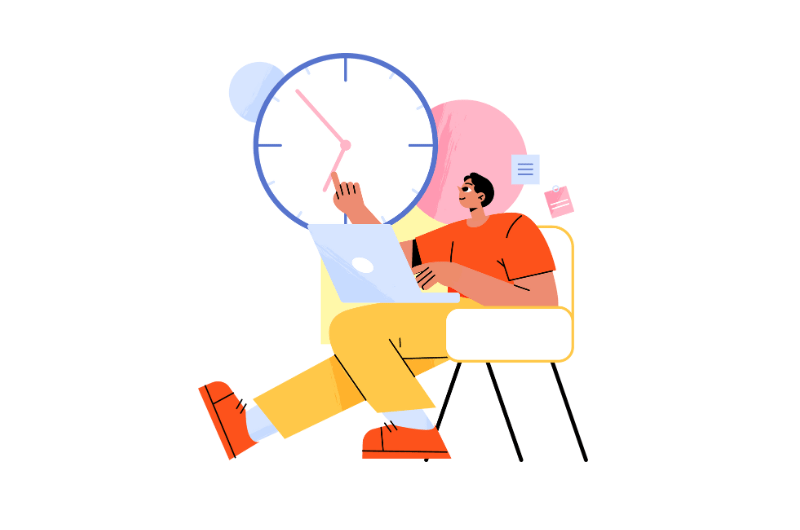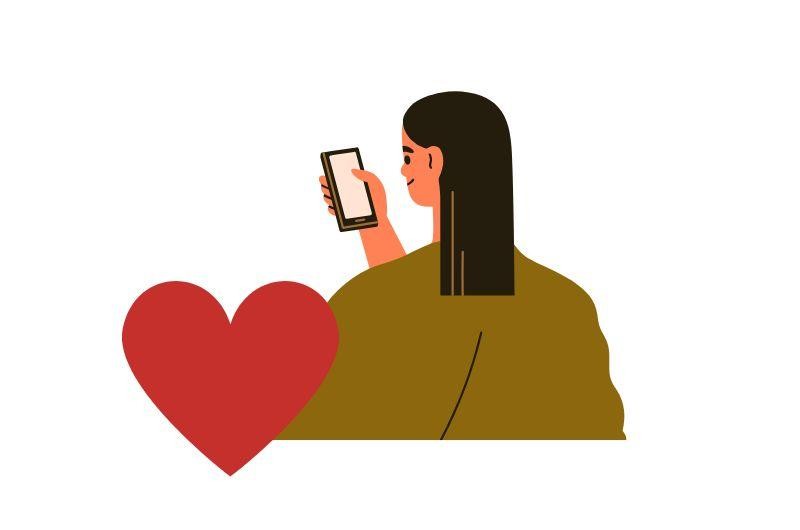Health & Wellness
From medical care and mental health counseling to wellness coaching, nutrition guidance, and stress management tools—UMD is committed to fostering a culture of care and balance.
What resources are available at the Health Center?
University Health Center (UHC) is a fully accredited ambulatory health care clinic located across the street from the Adele H. Stamp Student Union. UHC offers a wide variety of services including: acute care, x-ray and laboratory services, a pharmacy, an allergy clinic, STI testing, international travel clinic, physical therapy; reproductive, sexual health, gynecological, and gender-affirming care services, orthopedics, immunizations, power-based violence education and advocacy health education and promotion, massage therapy, acupuncture, substance use intervention and treatment program and counseling, and psychiatry services.
The UHC can connect students with underlying medical conditions with specialists in the area.

There are 3 health-related requirements due before or shortly after beginning classes:
- Proof of immunizations (New students may submit information online. Students who do not submit their immunization record may be blocked from future class registrations.)
- Mandatory health insurance
- Wellness Trainings (Sexual Assault Prevention and Alcohol, Cannabis, and Opioid Prevention)
 What about parent/guardian access?
What about parent/guardian access?
In an emergency:
We make every effort to contact the person(s) listed as the emergency contact.
In non-urgent situations:
If your student is 18+, they may need to provide permission for their parent/guardian to access their medical information. Patient Authorization Form is accessible on health.umd.edu
Additionally - you may consider discussing an Advance Directive with your student. Visit myuhc.umd.edu, then click on “Downloadable Forms”, and follow instructions for “Maryland Advance Directive Form”
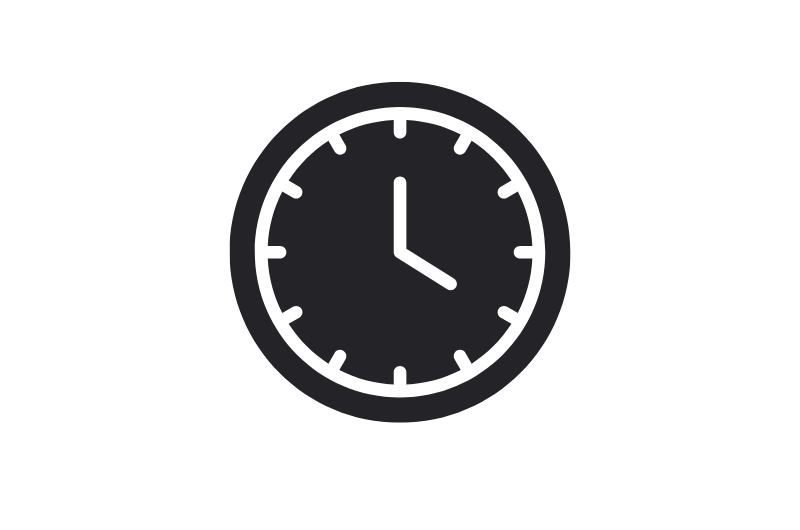 What should my student do if they need care when the University Health Center (UHC) is closed?
What should my student do if they need care when the University Health Center (UHC) is closed?
During the Fall and Spring Semesters, the Health Center is open Monday-Friday: 8 am - 5 pm. After hours, students can contact the 24-hour nurse advice line at 301-314-9386. (Urgent care facilities nearby have extended evening and weekend hours)
Students requiring mental health care after hours can call the University of Maryland Counseling Center crisis line at (301) 314-7651 or the National Suicide Prevention Lifeline at 988.
If your student experiences a medical or mental health emergency, they should call 911.
 Can my student transfer their current prescriptions to the University Health Center?
Can my student transfer their current prescriptions to the University Health Center?
The University Health Center has a pharmacy on-site, and can fill prescriptions from on- and off-campus providers when legally permissible. At your student’s request, prescription(s) can be transferred to our pharmacy.
There are also a number of pharmacies located close to campus, including some that are walking distance or near a Shuttle-UM route.
What are the costs?
Each academic year, the University requires all undergraduate students enrolled in 6 credits or more to have health insurance. All students will be automatically enrolled in the Student Health Insurance Plan (SHIP) unless they waive it.
Co-pays, co-insurance, and deductibles may apply and are due at the time of service. Although we accept many major insurance plans, there may be out-of-pocket costs depending on coverage. Additional fees are charged to see a specialist and for certain procedures such as x-rays, laboratory tests, allergy injections, or services such as behavioral health, substance use intervention and treatment, physical therapy, massage, nutrition, medications dispensed through the pharmacy and medical units, and for missed appointments or late cancellations.
Details are available on the website.
The UHC providers are contracted with the PPO and EPO insurance products of Aetna, United Healthcare, CareFirst/Blue Cross-Blue Shield, Cigna (PPO and Open Access Plus), and Tricare Prime. We can also file State of Maryland Medicaid plans for our registered students.
The UHC is a participating HMO for United Healthcare MDIPA and OPTIMUM CHOICE, or Blue Cross Blue Shield BLUE CHOICE.
For United Healthcare MDIPA or OPTIMUM CHOICE, call member services on your insurance card and make University Health Center as the PCP (Primary Care Provider) for your student for the visit at the University Health Center to be considered.
HMO office visits can be filed for BCBS BLUE CHOICE.
Please call your insurance plan provider's number to inquire if your plan is accepted at the University of Maryland Health Center (UHC). The following numbers will identify the UHC as participating or not within your individual insurance plan:
- Group NPI (National Provider Identification Number): 1508849639
- TIN (Tax Identification Number): 52-6002033.
To learn more about accepted health insurance plans, please visit: https://health.umd.edu/insurance-billing or call:
Commercial Insurance and Billing Questions 301-314-8147 uhc-billing@umd.edu
School Sponsored Student Insurance Office (SHIP) 301-314-8165 uhc-insurance@umd.edu
Can my student receive allergy injections at the University Health Center?
Yes. The Allergy Clinic administers allergy injections to students under the direction of their allergist or another physician. Allergy injections are administered by appointment only. The University Health Center does not perform initial allergy testing or administer the initial allergy serum at the start of desensitization.
Students interested in receiving allergy injections at the University Health Center should contact the Allergy Clinic over the summer. Charon Wallace RN, of the Allergy, Immunization, and Travel Clinic at the Health Center, will go over the process, paperwork, and intake appointment.
More information about the Allergy Clinic
Can my student get a flu shot at the University Health Center?
Yes. The University Health Center can provide flu shots to students. When the flu shot becomes available, we will update our website and social media handles: Facebook, Twitter/X, and Instagram (@umdhealthcenter).
The Student Health Insurance Plan fully covers the flu shot, with no copay. We are also able to bill many major insurance plans. More information about the University Health Center’s Immunization Clinic
Where is the nearest hospital to the University of Maryland Campus?
There are several hospitals close to the University of Maryland campus. Students transported by ambulance to a local hospital are most often taken to Adventist HealthCare White Oak Medical Center, located six miles from campus. Holy Cross Hospital and Doctors Community Hospital are also a short drive from campus.
Counseling Center
Location: Shoemaker Building
(301) 314-7651
counseling.umd.edu
The Counseling Center is the primary location for psychological services on campus and our staff specialize in college student mental health. We utilize a short-term model to provide a variety of free and confidential mental health services to students including brief individual counseling, group counseling, career counseling, evidence-based workshops, and psychoeducational programming.
The Counseling Center has counselors embedded in several UMD schools and colleges: Engineering, INFO College, Journalism, and Public Policy.
The first step to receiving any of our clinical services is to schedule a brief assessment with the Counseling Center. Same-day urgent crisis response is available during business hours by stopping by the Counseling Center reception desk. Crisis response is available by phone outside of business hours by calling (301) 314-7651. Life-threatening mental health emergencies should be addressed by calling 911 or visiting the nearest emergency room.
Warmline: Consultation for Families of Students
Phone Number: (301) 314-7651
Families who have concerns about the mental health of their UMD student may consult with Counseling Center staff by calling the Warmline during our hours of operation. A counselor will contact you within 24 hours. The warmline is not a crisis line. Life-threatening emergencies should be addressed by contacting 911 or visiting the nearest emergency room.
Warmline callers can explore options for helping students address their difficulties, such as signs of mental illness or substance abuse, difficulty adjusting or making friends, the impact of mental health on academics, strategies for encouraging their student to seek help, and more.
How much do your services cost?
Counseling Center services are free to registered UMD students. There is no door fee and we do not bill insurance or require a copay.
Who is eligible for services?
All registered UMD students are eligible for services. The type and amount of services are based on a thorough evaluation of each student’s clinical concerns and needs.
Are my student’s concerns appropriate for the Counseling Center?
Students come to the Counseling Center with a variety of concerns, including adjustment difficulties, depression, anxiety, loneliness, career indecision, identity concerns, stress management, relationship difficulties, grief, procrastination, and more. There are no concerns too big or too small to start with a brief assessment at the Counseling Center.
Can I make an appointment for my student?
Appointments are made by the student. The student can either call the Counseling Center at (301) 314-7651 or come to Shoemaker Building to schedule a brief assessment appointment.
How long will it take for my student to be seen at the Counseling Center?
Brief Assessment appointments are typically available within 48 hours.
What if my student needs urgent support?
The Counseling Center has urgent support available 24/7. During business hours, crisis support is available in person at our office in the Shoemaker Building. At all other times, crisis support is available by phone at (301) 314-7651. For life threatening emergencies, call 911 or go to the nearest emergency room.
Will the Counseling Center reach out to my student to encourage them to seek help?
The Counseling Center supports each student’s agency to make decisions about their mental health care. As such, the Counseling Center does not initiate the start of services with students. Instead, we give students the autonomy to decide if and when they would like to utilize our services. We share information about our services with students across campus and encourage you to do the same with your student.
Are visits confidential? Are they part of the academic record? Can I receive an update regarding my student’s mental health care?
Counseling Center records are confidential and not part of the academic record. The Counseling Center follows professional ethical standards and all state and federal laws regarding confidentiality. Your student’s written permission is necessary before any information about your student’s Counseling Center experience can be released. We encourage family members to talk with their students directly about their mental health and any services they are receiving.
What if my student needs services outside of the scope of what is provided by the Counseling Center?
The Counseling Center works collaboratively with departments on campus and providers off-campus to ensure students receive care, providing warm referrals for services outside of our office. When students are in need of ongoing or specialized therapy, psychiatric medication, psychological assessment, or accommodations for mental health conditions, we will assist them in getting connected with a different university department or off-campus provider who can best meet their needs.
What qualifications do your counselors have?
Counseling Center professional staff includes licensed and experienced clinical social workers, professional counselors, and psychologists. Our staff specialize in college student mental health.
Accessibility and Disability Services
At Accessibility and Disability Service (ADS), we recognize that each student's disability-related access needs are unique. We tailor our approach to each individual's specific concerns, so that every student can fully participate, engage, and thrive.
Contact:
301-314-7682
adsfrontdesk@umd.edu ads.umd.edu
What is a disability? Anyone who has a documented disability is eligible to apply for reasonable accommodations. The ADA Amendments Act of 2008 defines a disability as a physical or mental impairment that substantially limits one or more major life activities. Disabilities can vary widely, some might be easily recognizable while many are invisible.
What options are there for support?
Adjustments are designed to meet individual needs without altering university standards.
Examples of where accommodations are used include but are not limited to the following areas:
- Academic courses
- Experiential learning (i.e. field work, clinical rotations, internships, etc.)
- Research (i.e. capstone, thesis, dissertation, etc.)
- On-campus housing
- Student employment (i.e. hourly jobs, assistantships, etc.)
How does my student start receiving accommodations? Students will complete a registration application to get started where they will disclose their disability and express a desire for formal accommodations. They will then meet with a disability specialist to discuss
What documentation does my student have to provide? Lack of documentation will not prevent us from meeting with you. Any student can meet with our office to discuss their situation and explore options for support. We can also help you understand how to get documentation if needed.
What options are there for students to stay active?
RecWell is the place to look for activities such as fitness training, personal training, club and intramural sports and more. Any student paying the full student fee package has access to RecWell facilities and programs using their student ID card. Guest passes are available at $10/day.
- Fitness, including group classes (Sign up through Active Terp portal)
- Personal training*
- Intramural Sports
- Club sports
- Adventure program*
- Golf*
- Aquatics
- Esports
- Community & Youth programs*
*Offerings marked with an asterisk indicate an additional cost associated with it.
Additional helpful links:
Substance Use Intervention & Treatment (SUIT) provides short-term, evidence-based psycho-educational interventions, treatment/counseling, consultation, and advocacy for students who are experiencing problems related to their or another person’s substance use.
Campus Advocates Respond and Educate (CARE) to Stop Violence provides free, confidential advocacy and therapy services to primary and secondary survivors of sexual assault, relationship violence, stalking, and sexual harassment, and aims to prevent violence through educational presentations, events, and outreach activities.
Meditation (pre-recorded and via zoom)

